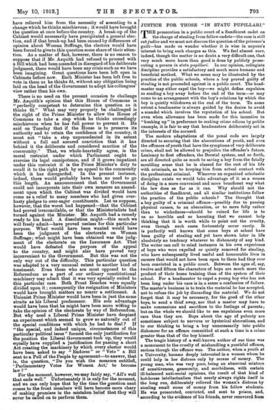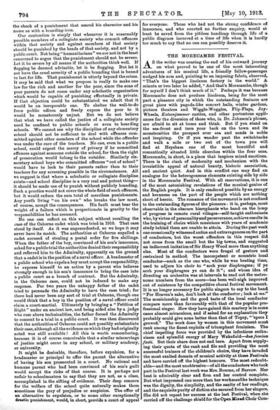JUSTICE FOR THOSE "IN STATU PUPILLIRI."
THE prosecution in a public court of a Sandhurst cadet on the charge of stealing from fellow-cadets—the case is still sub judice and we must not discuss the question of the prisoner's guilt—has made us wonder whether it is wise in anyone's interest to bring such charges as this. We feel almost sure, indeed, though the matter is no doubt a very difficult one, that very much more harm than good is done by publicly prose- cuting a person in static pupillari. In our opinion, collegiate discipline provides a satisfactory and much more humane and beneficial method. What we mean may be illustrated by the practice of the public schools, where a boy proved guilty of stealing is not proceeded against in a public court. The head- master may either expel the boy—we might define expulsion as sending a boy away before the end of the term—or may come to an arrangement with the boy's relations by which the boy is quietly withdrawn at the end of the term. To some extent a headmaster is always guided by the desire to avoid a scandal which involves the reputation of his school. But even when allowance has been made for this incentive to "hushing up" in preference to making crime odious by public example, it is fair to say that headmasters deliberately act in the interests of the accused.
The modern adaptations of the penal code are largely directed to securing that the aberrations of youth, and even the offences of youth that have the symptoms of very deliberate crime, shall not be allowed to prejudice the offender's future. Leniency to first offenders, the Borstal system, and so forth, are all directed quite as much to saving a boy from the fatally moulding sense that he is classed for the rest of his life with criminals, as to keeping him from actual contact with the professional criminal. Wherever an organized scholastic discipline exists we would take advantage of it as a means of doing in a more convenient and more beneficent way what the law does as far as it can. Why should not the authorities of Sandhurst, and all similar institutions follow the practice of the public schools ? The thought that a boy guilty of a criminal offence—possibly due to passing physical causes, to an aberration, or to mere folly rather than to wickedness—should be ruined for life is to us so horrible and so haunting that we cannot help thinking that it is worth while to point out the cruelty, even though such cases fortunately occur rarely. It is perfectly well known that some boys at school have been guilty of stealing and yet have shown later in life absolutely no tendency whatever to dishonesty of any kind. The writer can call to mind instances in his own experience of boys who were expelled or quietly removed for stealing, who have subsequently lived useful and honourable lives in careers that would not have been open to them had they ever been convicted in a public court. Between the ages of, say, twelve and fifteen the characters of boys are much more the product of their home training than of the system of their school. For a headmaster to expel a young boy who has not been long under his care is in a sense a confession of failure. The master's business is to train the material he has accepted, not to refuse the job by discarding the material. We do not forget that it may be necessary, for the good of the other boys, to send a thief away, nor that a master may have to make concessions and sacrifices to the feelings of parents ; but on the whole we should like to see expulsions even more rare than they are. Boys about the age of puberty are sometimes subject to nervous or hysterical aberrations, and to our thinking to bring a boy unnecessarily into public dishonour for an offence committed at such a time is a crime greater than that of the boy himself.
The tragic history of a well-known author of our time was a monument to the cruelty of mishandling a youthful offence, serious though the offence was. The author, when a youth at a University, became deeply interested in a woman whom he could help in her distress only by means of money. The young man, who was very poor, being an abnormal mixture of sensitiveness, generosity, and morbidness, with certain ill-balanced anti-social opinions, the result of that kind of hot-house intellectualism that nearly always rights itself in the long run, deliberately relieved the woman's distress by stealing small sums of money from his fellow students.
He was prosecuted, convicted, and sent to prison, and, according to the evidence of his friends, never recovered from
the shock of a punishment that seared his character and his name as with a branding-iron.
Our contention is simply that whenever it is reasonably possible members of a collegiate society who commit offences within that society and against members of that society should be punished by the heads of that society, and not by a public court. Not being " humanitarians " we are not in the least concerned to argue that the punishment should not be severe. Let it be severe by all means if the authorities think well. If flogging be deemed advisable, let it be flogging. But let it not have the cruel severity of a public branding that is bound to last for life. That punishment is utterly beyond the crime.
It may be said that what we propose is really to make one law for the rich and another for the poor, since the sons of poor parents do not come under any scholastic organization which would be capable of punishing effectually in private. If that objection could be substantiated we admit that it would be an insuperable one. To shelter the well-to-do from public odium and freely expose the poor to it would be monstrously unjust. But we do not believe that what we have called the justice of a collegiate society need be confined to public schools or even to boarding schools. We cannot see why the discipline of any elementary school should not be sufficient to deal with offences corn. mitted against other members of the school while the offender was under the care of the teachers. No one, even in a public school, could expect the mercy of privacy if he committed offences against someone outside the school, for then the right of prosecution would belong to the outsider. Similarly ele- mentary school boys who committed offences "out of school" would have to look to their parents rather than to their teachers for any screening possible in the circumstances. All
we suggest is that where a scholastic or collegiate discipline exists—and school discipline is a very real and potent thing—
it should be made use of to punish without publicly branding.
Such a practice would not cover the whole field of such offences, but it would reduce the sum total of merciless punishments.
Any youth living " on his own " who breaks the law must, of course, accept the consequences. His fault must bear the weight of a failure which is proportionate in gravity to the responsibilities be has assumed.
No one can reflect on this subject without recalling the ease of the Osborne cadet which was tried in 1910. That case stood by itself. As it was unprecedented, so we hope it may never have its match. The authorities at Osborne expelled a cadet accused of stealing a postal order for five When the father of the boy, convinced of his son's innocence, asked for a public trial the authorities denied their responsibility and referred him to the Admiralty, apparently on the ground that a cadet is in the position of a naval officer. A headmaster of a public school who expels a boy must accept the responsibility; he exposes himself to an action by a parent who believes strongly enough in his son's innocence to bring the case into a public court as a breach of contract. But the Admiralty, in the Osborne case, could not be induced to make any response. For two years the unhappy father of the cadet tried to persuade the Admiralty to have the case tried ; for there had never been any sort of trial at Osborne, though one would think that a boy in the position of a naval officer could claim a court-martial. Ultimately by bringing a " Petition of Right " under an ancient law, and being aided also by a judge who rose above technicalities, the father forced the Admiralty to consent to a trial in a public court. It was then discovered that the authorities of Osborne could not possibly substantiate their case, although all the evidence onwhich they had originally acted was still available ! All this is worth remembering, because it is of course conceivable that a similar miscarriage of justice might occur in any school, or military academy, or university.
It might be desirable, therefore, before expulsion, for a headmaster or principal to offer the parent the alternative of having his son prosecuted in a court. No rational and humane parent who had been convinced of his son's guilt -would accept the risks of that course. It is perhaps not unfair to schoolmasters to say that they are not, as a class, accomplished in the sifting of evidence. Their deep concern for the welfare of the school quite naturally makes them sometimes the prey of prejudice or suspicion. The offer of an alternative to expulsion, or to some other exceptionally drastic punishment, would, in short, provide a court of appeal
for everyone. Those who had not the strong confidence of innocence, and who courted no further enquiry, would at least be saved from the pitiless handicap through life of a public disgrace incurred at a time of life when it is hardly too much to say that no one can possibly deserve it.











































 Previous page
Previous page